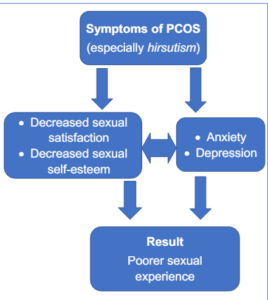Polycystic ovary syndrome (PCOS) is the most prevalent endocrine disorder among women of reproductive age, characterized by enlarged ovaries with a polycystic appearance, menstrual irregularities, excessive body hair growth (hirsutism), and sometimes acne. Women with PCOS often face challenges like anovulatory infertility, obesity, insulin resistance, and lipid disorders. Additionally, there is a heightened risk of developing type 2 diabetes, cardiovascular disease, and endometrial cancer.
In clinical settings, PCOS treatment primarily targets physical symptoms. However, the psychosocial and sexual well-being of women with PCOS, which can significantly impact daily life, is less frequently addressed. Research indicates that women with PCOS may experience higher levels of stress, depression, and anxiety. These women often report feeling less feminine due to symptoms like hirsutism, menstrual irregularities, and infertility, which can also lower their quality of life (QOL). Overweight and obesity are major factors contributing to reduced QOL in women with PCOS. Furthermore, hirsutism and acne are linked to greater body dissatisfaction and anxiety. Studies also suggest that women with PCOS are generally less satisfied with their sex lives, feel less sexually attractive, and believe their partners share this perception. This dissatisfaction can stem from concerns about body hair and overall appearance, affecting their ability to form social contacts. Despite these challenges, women with PCOS do not differ significantly from controls in terms of partner status and sexual activity frequency. However, adolescent girls with PCOS may be less sexually active than their healthy peers.

Association with Psychological Well-being
- – Menstrual Irregularities: Women with amenorrhea exhibited lower self-esteem and greater fear of negative appearance evaluation than those with oligomenorrhea.
- – Hyperandrogenism: Associated with poorer body satisfaction but not self-esteem or fear of negative appearance.
- – Hirsutism: Linked to lower self-esteem, poorer body satisfaction, and greater fear of negative appearance evaluation.
- – Acne: Associated with poorer body satisfaction but not with self-esteem or fear of negative appearance.
- – BMI: Higher BMI was correlated with lower self-esteem, poorer body satisfaction, and greater fear of negative appearance evaluation.
Quality of Life in Patients with PCOS
Patients with PCOS (Polycystic Ovary Syndrome) generally have significantly lower quality-of-life scores compared to those without PCOS. Factors such as obesity, hyperandrogenism, PCOS-related complications, and depression adversely impact their quality of life, yet these issues are often not systematically managed. However, managing these conditions can improve their quality of life, although it remains lower than that of control groups. For instance, a study evaluating the effect of oral contraception in PCOS patients with hirsutism found that improvements in these symptoms led to enhanced well-being. Despite this, contraception did not positively impact depression and anxiety scores after six months of treatment. The negative impact of PCOS on quality of life persists over time, even into the later reproductive years, similar to chronic conditions like asthma or migraines. Therefore, it is recommended to assess the impact of PCOS on quality of life using specific questionnaires like the PCOSQ, which evaluates five domains: weight, cycle disorders, hirsutism, infertility, and psychological impact.
Impact on Body Image
PCOS patients often experience more concerns about their weight and have a lower appreciation of their appearance and health. These factors predict a higher risk of depression and anxiety. In a study involving video interviews with 10 PCOS patients, six reported that PCOS symptoms affected their self-perception as women. Another photographic analysis study found that patients often used masculine vocabulary to describe their symptoms, such as “shaving the moustache.”
Impact on Lifestyle
Lifestyle modifications, particularly for overweight or obese individuals, are crucial in managing PCOS and are the first line of non-pharmacological treatment. However, a study evaluating diet and increased physical activity in newly diagnosed PCOS patients found no significant changes post-diagnosis. Although lifestyle changes can improve certain PCOS parameters like ovulation rate and cycle regularity, their positive effect on quality of life is difficult to demonstrate due to limited data. Moreover, PCOS patients are at a higher risk of weight gain, which is associated with lifestyle habits.
Impact on Sexual Life and Contraception Use
PCOS diagnosis affects contraception use, with studies showing that a higher percentage of PCOS patients discontinue contraception post-diagnosis compared to those without PCOS. An Australian cohort found that fewer PCOS patients used contraception, despite oral contraceptives being essential for managing cycle disorders and hyperandrogenism. These patients were also more likely to be trying to conceive. PCOS impacts sexual satisfaction, with higher rates of dissatisfaction and issues like insufficient vaginal lubrication reported by PCOS patients compared to non-PCOS patients. This impact extends to adolescents, who report less sexual activity, although the age of first intercourse is similar between groups. A review highlighted PCOS’s effect on various aspects of sexual health, emphasizing the need to assess sexual health during consultations.
Impact on Life Plans/Role of Infertility
Concerns about fertility start early for PCOS patients. A study using Facebook to recruit 30 PCOS patients identified themes such as anxiety about conceiving, lack of information on pregnancy, and a desire for diverse sources of information on PCOS and infertility. Most patients are aware of possible infertility issues and express anxiety about it. However, a 2008 study found no significant difference in depressive symptoms or quality of life between PCOS patients with or without a current desire for pregnancy.
Ways you can enhance your intimate life.
1. Tend to Your PCOS
The most crucial step is to focus on managing your PCOS, as it is a significant contributing factor. Adopting lifestyle habits such as a low-sugar diet, and engaging in exercises like Pilates, yoga, and swimming, can significantly alleviate PCOS symptoms. Medications like birth control pills can help regulate hormonal imbalances by increasing female hormone levels and counteracting excessive male hormones. This can help regularize your menstrual cycles, reduce anxiety and stress, and improve your libido.
2. Communicate
Open and honest communication is key to resolving many issues, including those in your sex life. While it can be challenging to discuss insecurities, doing so can greatly enhance intimacy. Talk to your partner about your feelings and desires. Communicating your needs fosters emotional closeness and can boost your libido. Ensure you feel accepted in your romantic or sexual relationship.
3. Experiment
Don’t be afraid to explore and experiment in your sexual relationship. Trying new things like sexual fantasies, toys, and different forms of foreplay (including period sex if it appeals to you) can bring excitement and confidence, enhancing your intimate experiences.
4. Recognize Your Beauty
PCOS can affect your self-image, but it’s important to ground yourself and remember that you are more than your body. Avoid comparing yourself to others, and focus on your unique beauty and worth.
5. Unwind
De-stressing is vital for a healthy sex life. Relaxation techniques can increase arousal and lead to a more pleasurable climax. Take time to unwind and reduce stress to enhance your intimate experiences.
6. Eliminate Habits that Hamper Sex Drive
Habits like smoking and substance abuse can negatively affect sex drive, regardless of PCOS. Eliminating these habits can increase libido and improve your overall sexual health.
Learn More With Veera
Women with PCOS often struggle with lower self-esteem, body dissatisfaction, and fear of negative appearance due to symptoms like menstrual irregularities, hirsutism, and higher BMI. Addressing these psychological aspects is crucial for improving the overall well-being of women with PCOS, beyond merely treating the physical symptoms, this is why PCOS experts at Veera Health focus on your sexual and psychological health while managing your PCOS.




















